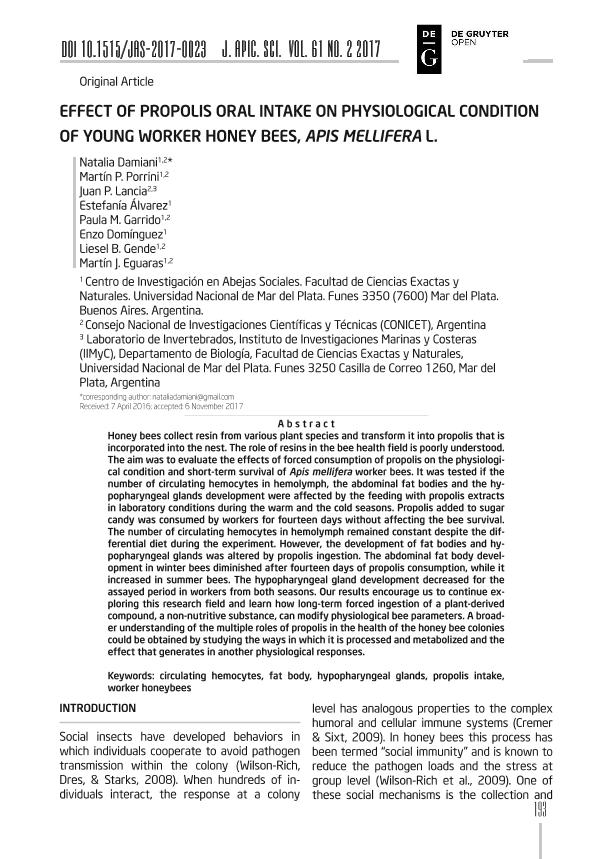Mostrar el registro sencillo del ítem
dc.contributor.author
Damiani, Natalia

dc.contributor.author
Porrini, Martín Pablo

dc.contributor.author
Lancia, Juan Pablo

dc.contributor.author
Álvarez, Estefanía

dc.contributor.author
Garrido, Paula Melisa

dc.contributor.author
Dominguez, Enzo

dc.contributor.author
Gende, Liesel Brenda

dc.contributor.author
Eguaras, Martin Javier

dc.date.available
2018-08-17T17:18:37Z
dc.date.issued
2017-12
dc.identifier.citation
Damiani, Natalia; Porrini, Martín Pablo; Lancia, Juan Pablo; Álvarez, Estefanía; Garrido, Paula Melisa; et al.; Effect of propolis oral intake on physiological condition of young worker honey bees, apis mellifera L.; Research Inst Pomology Floriculture; Journal Of Apicultural Science; 61; 2; 12-2017; 193-202
dc.identifier.issn
1643-4439
dc.identifier.uri
http://hdl.handle.net/11336/56192
dc.description.abstract
Honey bees collect resin from various plant species and transform it into propolis that is incorporated into the nest. The role of resins in the bee health field is poorly understood. The aim was to evaluate the effects of forced consumption of propolis on the physiological condition and short-term survival of Apis mellifera worker bees. It was tested if the number of circulating hemocytes in hemolymph, the abdominal fat bodies and the hypopharyngeal glands development were affected by the feeding with propolis extracts in laboratory conditions during the warm and the cold seasons. Propolis added to sugar candy was consumed by workers for fourteen days without affecting the bee survival. The number of circulating hemocytes in hemolymph remained constant despite the differential diet during the experiment. However, the development of fat bodies and hypopharyngeal glands was altered by propolis ingestion. The abdominal fat body development in winter bees diminished after fourteen days of propolis consumption, while it increased in summer bees. The hypopharyngeal gland development decreased for the assayed period in workers from both seasons. Our results encourage us to continue exploring this research field and learn how long-term forced ingestion of a plant-derived compound, a non-nutritive substance, can modify physiological bee parameters. A broader understanding of the multiple roles of propolis in the health of the honey bee colonies could be obtained by studying the ways in which it is processed and metabolized and the effect that generates in another physiological responses.
dc.format
application/pdf
dc.language.iso
eng
dc.publisher
Research Inst Pomology Floriculture

dc.rights
info:eu-repo/semantics/openAccess
dc.rights.uri
https://creativecommons.org/licenses/by-nc-sa/2.5/ar/
dc.subject
Circulating Hemocytes
dc.subject
Fat Body
dc.subject
Hypopharyngeal Glands
dc.subject
Propolis Intake
dc.subject
Worker Honeybees
dc.subject.classification
Otras Ciencias Veterinarias

dc.subject.classification
Ciencias Veterinarias

dc.subject.classification
CIENCIAS AGRÍCOLAS

dc.title
Effect of propolis oral intake on physiological condition of young worker honey bees, apis mellifera L.
dc.type
info:eu-repo/semantics/article
dc.type
info:ar-repo/semantics/artículo
dc.type
info:eu-repo/semantics/publishedVersion
dc.date.updated
2018-07-23T18:00:45Z
dc.journal.volume
61
dc.journal.number
2
dc.journal.pagination
193-202
dc.journal.pais
Polonia

dc.journal.ciudad
Pulawy
dc.description.fil
Fil: Damiani, Natalia. Consejo Nacional de Investigaciones Científicas y Técnicas; Argentina. Universidad Nacional de Mar del Plata. Facultad de Ciencias Exactas y Naturales; Argentina
dc.description.fil
Fil: Porrini, Martín Pablo. Consejo Nacional de Investigaciones Científicas y Técnicas; Argentina. Universidad Nacional de Mar del Plata. Facultad de Ciencias Exactas y Naturales; Argentina
dc.description.fil
Fil: Lancia, Juan Pablo. Consejo Nacional de Investigaciones Científicas y Técnicas. Centro Científico Tecnológico Conicet - Mar del Plata. Instituto de Investigaciones Marinas y Costeras. Universidad Nacional de Mar del Plata. Facultad de Ciencia Exactas y Naturales. Instituto de Investigaciones Marinas y Costeras; Argentina
dc.description.fil
Fil: Álvarez, Estefanía. Universidad Nacional de Mar del Plata. Facultad de Ciencias Exactas y Naturales; Argentina
dc.description.fil
Fil: Garrido, Paula Melisa. Consejo Nacional de Investigaciones Científicas y Técnicas; Argentina. Universidad Nacional de Mar del Plata. Facultad de Ciencias Exactas y Naturales; Argentina
dc.description.fil
Fil: Dominguez, Enzo. Consejo Nacional de Investigaciones Científicas y Técnicas; Argentina. Universidad Nacional de Mar del Plata. Facultad de Ciencias Exactas y Naturales; Argentina
dc.description.fil
Fil: Gende, Liesel Brenda. Consejo Nacional de Investigaciones Científicas y Técnicas; Argentina. Universidad Nacional de Mar del Plata. Facultad de Ciencias Exactas y Naturales; Argentina
dc.description.fil
Fil: Eguaras, Martin Javier. Consejo Nacional de Investigaciones Científicas y Técnicas; Argentina. Universidad Nacional de Mar del Plata. Facultad de Ciencias Exactas y Naturales; Argentina
dc.journal.title
Journal Of Apicultural Science

dc.relation.alternativeid
info:eu-repo/semantics/altIdentifier/doi/https://dx.doi.org/10.1515/jas-2017-0023
dc.relation.alternativeid
info:eu-repo/semantics/altIdentifier/url/https://content.sciendo.com/view/journals/jas/61/2/article-p193.xml
Archivos asociados
